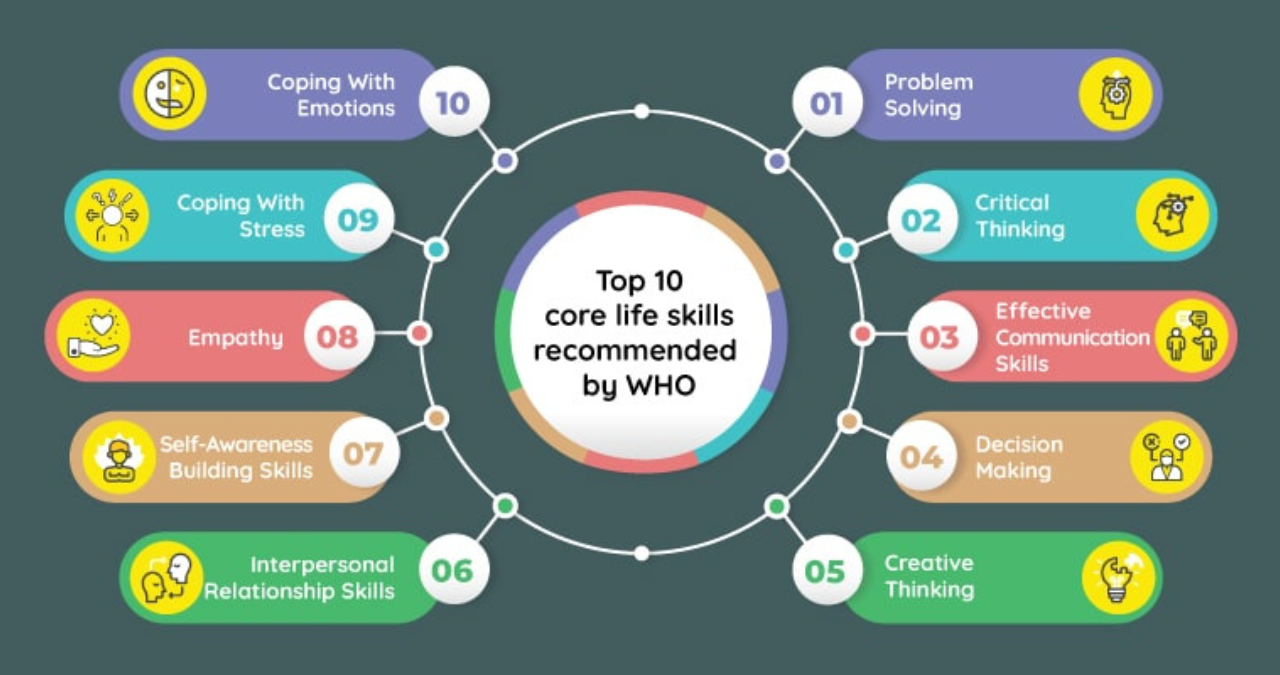Life skills are the abilities that enable individuals to effectively navigate the challenges of life. Whether it’s managing emotions, resolving conflicts, or making decisions, life skills empower us to lead balanced, fulfilling lives. In a world that constantly demands adaptability, building and refining these skills is crucial for both personal and professional success. In this article, we will explore the different types of life skills, their importance at various stages of life, and how you can develop them to enhance your life.
Types of Life Skills
Life skills can be divided into several categories based on their application and the areas of life they impact. Each type plays an important role in helping us succeed and grow as individuals.
1.1 Personal Development Skills
Personal development skills are the foundation of emotional well-being and self-improvement. These skills help individuals understand themselves better and navigate life’s complexities with emotional intelligence. Self-awareness, for example, allows people to recognize their emotions and how these emotions impact their thoughts and actions. This leads to better emotional regulation, which is essential for stress management and maintaining healthy relationships.
Time management is another crucial personal development skill. In a fast-paced world, being able to manage your time effectively is key to productivity and maintaining a healthy work-life balance. By prioritizing tasks, setting realistic goals, and avoiding procrastination, you can reduce stress and boost your efficiency. Additionally, practicing mindfulness can help you stay focused, manage stress, and improve overall well-being.
1.2 Social Skills

Social skills are essential for interacting effectively with others. Communication, both verbal and non-verbal, is the cornerstone of social interactions. Being able to clearly express thoughts and ideas while listening actively to others builds strong relationships and promotes understanding. Good communication also involves body language, tone, and facial expressions, which contribute significantly to how we are perceived and how we perceive others.
Conflict resolution is another important social skill. Whether in personal or professional settings, conflicts are inevitable. The ability to resolve disagreements respectfully and constructively helps maintain harmony and fosters cooperation. Negotiation skills are also crucial in both personal relationships and career advancement, as they allow individuals to reach mutually beneficial solutions to problems.
1.3 Practical Skills
Practical skills are the abilities that we use in everyday life to solve problems and make decisions. Financial management is one of the most important practical skills, as it directly impacts your quality of life. Being able to create and stick to a budget, save money, and make wise investments ensures financial stability and long-term security.
Problem-solving and critical thinking are also key practical skills. Whether at home, at work, or in social situations, the ability to approach challenges with a logical, solution-oriented mindset allows you to handle unexpected situations with ease. Decision-making, another important practical skill, enables individuals to make informed choices that align with their values and long-term goals. Lastly, adaptability is essential in a world that is constantly changing, as it helps individuals stay resilient and open to new opportunities.
1.4 Leadership and Entrepreneurial Skills
Leadership and entrepreneurial skills are vital for those looking to inspire others and achieve personal or business success. Leadership is not just about giving orders, but also about leading by example, motivating others, and creating an environment where everyone can thrive. A good leader knows how to communicate a vision, support their team, and navigate challenges.
Entrepreneurial skills are closely related to leadership but focus more on innovation, risk-taking, and problem-solving in the business world. Being able to think creatively, seize opportunities, and take calculated risks can lead to the creation of successful businesses or initiatives. Both leadership and entrepreneurial skills require resilience, self-confidence, and a forward-thinking mindset.
The Importance of Life Skills in Different Phases of Life
Life skills are important at every stage of life, from childhood to adulthood, and they evolve as we grow and face new challenges.
2.1 Life Skills in Childhood
In childhood, life skills lay the foundation for emotional and social development. Children learn the basics of emotional resilience through experiences that teach them how to handle disappointment, frustration, and failure. These early lessons in managing emotions can help them cope with future challenges. Children also develop communication skills, such as listening and expressing themselves clearly, which are crucial for building relationships with peers and adults.
As children grow, they begin to understand the value of responsibility and independence. Teaching children how to take care of themselves, manage their time, and complete tasks fosters a sense of self-reliance. These early life skills contribute significantly to their ability to navigate the challenges of adolescence and adulthood.
2.2 Life Skills for Adolescents and Young Adults
Adolescence is a time of transition, and the life skills learned during this stage play a critical role in shaping a young adult’s future. As teenagers move from school to the workforce, they need to develop skills such as time management, self-motivation, and professionalism. Effective communication, conflict resolution, and emotional intelligence are also vital as they navigate peer relationships and romantic partnerships.
Young adults face unique challenges, including managing finances, building a career, and making long-term decisions about their future. Developing life skills like decision-making, financial literacy, and stress management equips them with the tools to handle these transitions with confidence.
2.3 Life Skills for Adults
For adults, life skills are essential for maintaining balance and ensuring long-term success. As individuals juggle work, family, and personal life, the ability to manage time and set priorities becomes increasingly important. Financial management skills, such as budgeting, investing, and saving for retirement, are key to securing financial independence and planning for the future.
Moreover, personal development skills such as continual learning and adaptability are essential for career advancement. Being able to handle stress, maintain a healthy work-life balance, and embrace change ensures that adults can thrive in both their personal and professional lives.
How to Develop Life Skills
Developing life skills is a continuous process that involves self-reflection, practice, and learning from others.
3.1 Self-Assessment and Identifying Areas for Improvement
The first step in developing life skills is self-assessment. Take time to reflect on your strengths and weaknesses, and identify the skills you want to improve. This could involve journaling, setting personal goals, or seeking feedback from others. Once you’ve identified the areas you want to work on, set clear, achievable goals to guide your progress.
3.2 Learning Through Practice and Experience
Life skills are best learned through practice. Volunteering, internships, and hands-on experiences provide opportunities to develop new skills in real-world settings. By actively engaging with different situations, you can improve your problem-solving, communication, and leadership abilities.
3.3 Seeking Mentorship and Guidance
Mentorship can be a powerful tool for personal growth. A mentor can offer advice, share their experiences, and guide you through challenges. Whether it’s a career mentor, a life coach, or a trusted friend, having someone to provide perspective can accelerate your development of life skills.
3.4 Online Courses and Resources
In today’s digital age, there are countless online platforms that offer courses on life skills. Websites like Coursera, Udemy, and LinkedIn Learning provide courses on topics ranging from financial literacy to leadership and communication. Reading books, listening to podcasts, and following blogs dedicated to personal development can also be valuable resources for lifelong learning.
Overcoming Challenges in Developing Life Skills
While developing life skills is crucial, it’s not always easy. There are several challenges that individuals may face along the way.
4.1 Addressing Fear of Failure
One of the biggest obstacles to developing life skills is the fear of failure. Embracing a growth mindset, where failure is seen as an opportunity to learn, can help overcome this fear. By viewing setbacks as part of the learning process, you can remain motivated and resilient in your pursuit of personal growth.
4.2 Overcoming Lack of Resources and Support
Not everyone has access to the same resources when it comes to developing life skills. However, there are many free or low-cost opportunities available, such as community workshops, online courses, and self-help books. Building a support network of friends, family, and mentors can also help you stay motivated and focused on your goals.
4.3 Maintaining Motivation and Consistency
Consistency is key when developing life skills. Building routines and setting small, achievable goals can help you stay on track. Celebrate your progress along the way, and don’t be afraid to adjust your approach if necessary. Staying motivated and maintaining a positive mindset will ensure that you continue to grow and improve.
Conclusion
Life skills are essential for personal growth, professional success, and overall well-being. From personal development to social interactions, practical decision-making to leadership, life skills shape every aspect of our lives. By understanding the importance of these skills and making a conscious effort to develop them, individuals can improve their ability to navigate life’s challenges and achieve their goals. Start today, and invest in your personal growth – the rewards will be lifelong.
Frequently Asked Questions (FAQs)
- What are the most important life skills to learn? The most important life skills include communication, time management, emotional intelligence, problem-solving, and financial management.
- How can I improve my communication skills? Practice active listening, engage in open conversations, and focus on both verbal and non-verbal communication. Consider taking a course or attending workshops.
- What is the difference between hard skills and life skills? Hard skills are specific, teachable abilities like coding or accounting, while life skills are broader abilities that help you navigate day-to-day challenges.
- How do life skills affect career success? Life skills such as communication, leadership, and time management are crucial for building relationships, managing responsibilities, and advancing in your career.
- Can life skills be taught, or are they innate? Life skills can be learned and developed over time through practice, experience, and education.
- How can I develop leadership skills without formal training? You can develop leadership skills by volunteering, taking on responsibilities, seeking mentorship, and practicing decision-making and problem-solving.
- Why is emotional intelligence considered a crucial life skill? Emotional intelligence helps you manage your emotions, understand others’ feelings, and build strong, supportive relationships – essential for both personal and professional success.
- What are some effective ways to learn problem-solving skills? Practice by facing challenges head-on, analyzing situations, brainstorming solutions, and evaluating the outcomes. Problem-solving is a skill that improves with experience.
- How can I balance developing life skills with a busy lifestyle? Set realistic goals, create a schedule, and focus on small, consistent actions. Prioritize skills that align with your immediate needs and long-term aspirations.
- Are life skills essential for children to learn from an early age? Yes, teaching children life skills such as emotional regulation, communication, and responsibility from an early age sets them up for success in the future.
You May Also Read:https://booksnews.co.uk/bubble-font/




